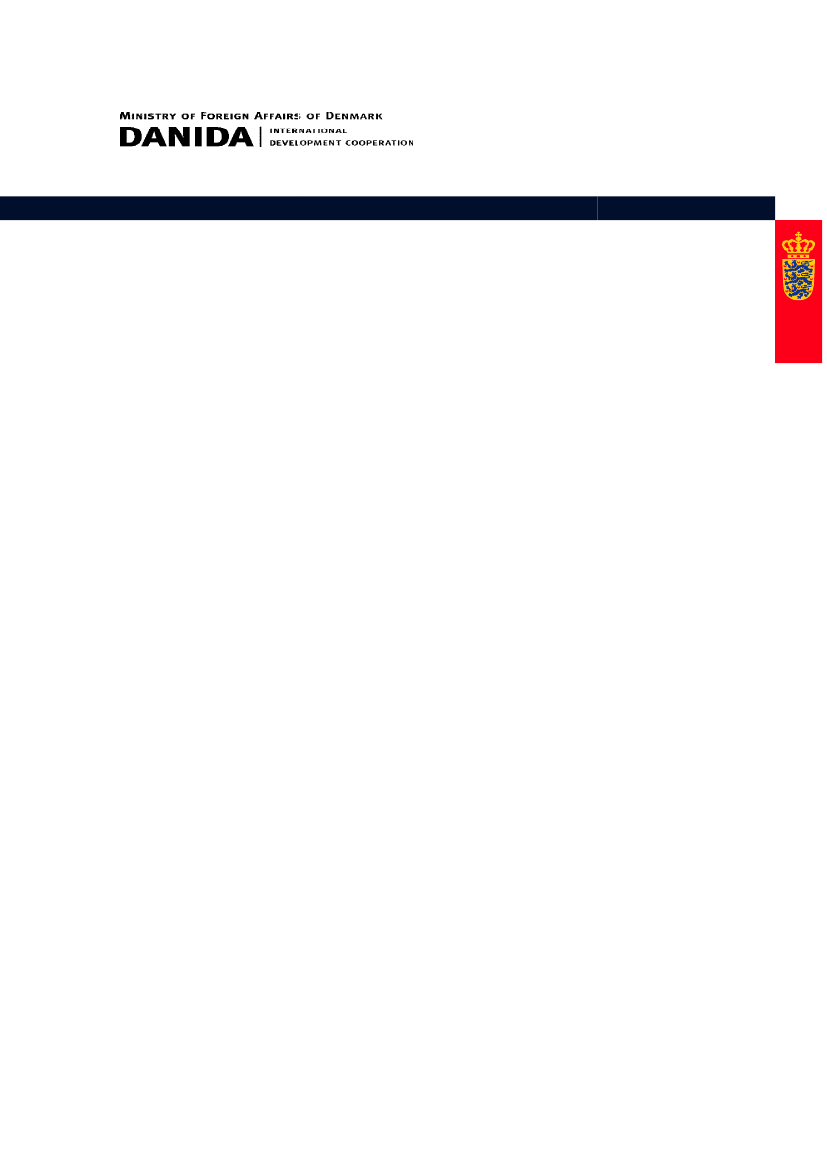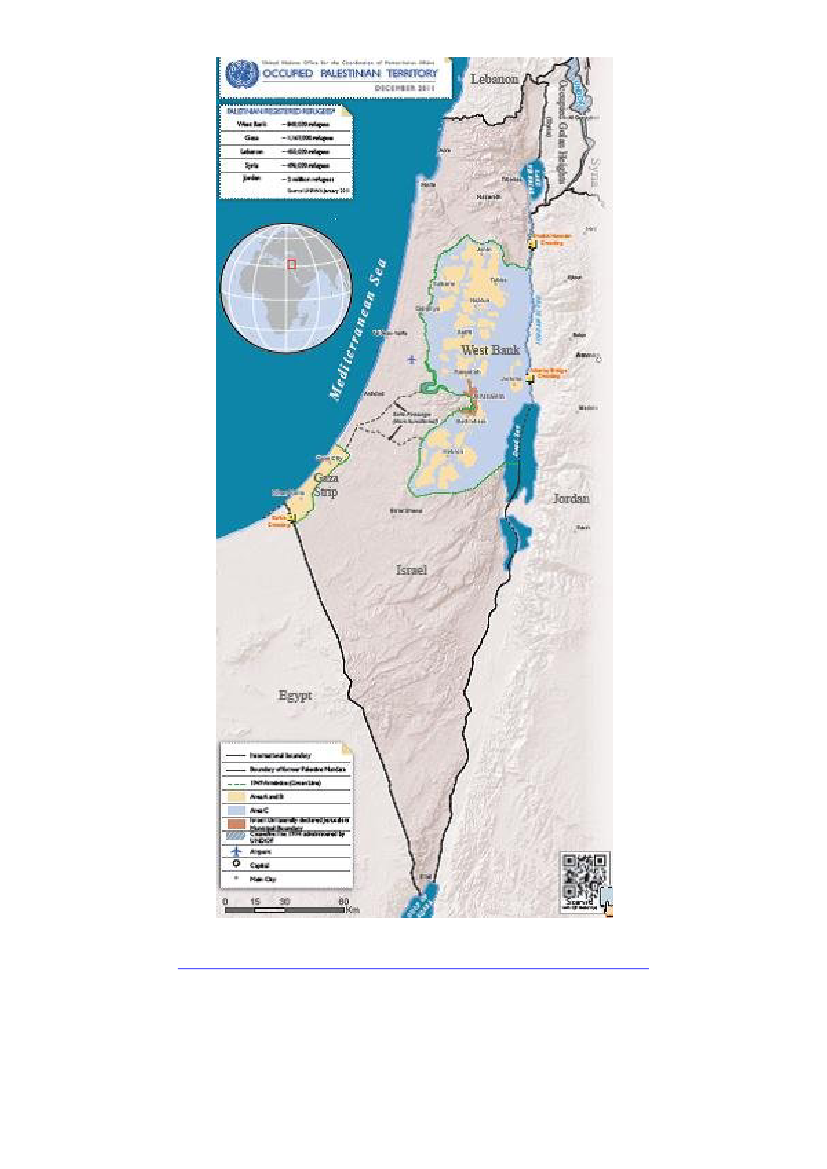Udenrigsudvalget 2013-14
URU Alm.del Bilag 149
Offentligt
DANISH-PALESTINIANPALESTINIANPARTNERSHIP 2014-2015
http://www.ochaopt.org/documents/ochaopt_atlas_opt_general_december2011.pdf
2
Executive SummaryTheoverall political objectiveof the Danish engagement is to support the realisation ofa two-state solution to the Israeli-Palestinian conflict, encompassing the State of Israeland an independent, democratic, sovereign and contiguous State of Palestine, living sideby side in peace and security. It is essential that it will be a viable and accountablePalestinian state, and that the security of Israel will be safeguarded. The aim is toimprove the protection of both Israeli and Palestinian civilians. The Danishgovernment’s policy on the Israeli-Palestinian conflict enjoys broad support in theDanish Parliament. In January 2014, all parties but one voted in favour of a motionlaying out the overall principles of this policy.The continued lack of a permanent solution is a major source of risk and instability inthe region affecting the security of the EU.The Danish Government will within theframework set out by international law and established EU policies – in closecollaboration with the EU and EU Member States on the ground – seek to achieve theobjective of a two-state solution, including the recognition of Palestine as a state whenappropriate.The on-going changes across the Arab world make the need for progress onthe Middle East peace process all the more urgent. It will be necessary to utilize a widerange of political and financial tools to achieve such progress. Denmark will in thecoming years strengthen its engagement in the Palestinian state building process,including through an increase in the level of financial assistance, in light of the currentcritical challenges facing it.Denmark strongly supports the efforts spearheaded by the US to ensure a negotiatedsolution to the conflict. However, the current challenges to the two-state solution mustnot be underestimated. Parts of these challenges relate to the Israeli occupation,including demolition of Palestinian properties, forced displacement of civilians and thecontinued Israeli settlement activity, the latter of which is illegal under international lawand constitutes an obstacle to peace. In addition to the direct violations of internationalhumanitarian and human rights law, the Israeli approach also results in anunsustainablefiscal-economic situation for the Palestinians. It is not possible to build a viableeconomy under the current conditions, and both Gaza and the West Bank including EastJerusalem are very reliant on donor support. But the challenges to the two-state solutionalso relate to internal Palestinian factors, especially the political splitbetween thePalestinian Authority (PA) in the West Bank and thedefactoHamas government inGaza; the need to strengthen the capacity of Palestinian institutions further as well asthe longstanding absence of Palestinian presidential and legislative elections. Despitethis backdrop, repeated World Bank assessments have concluded that the PalestinianAuthority has achieved significant progress and is above the threshold for a functioningstate in key sectors.The development potential of Palestine is considerable, but it can only be fully realizedthrough a sustainable political solution to the Israeli-Palestinian conflict. Danish
3
development assistance to Palestine will in the short and medium term continue to besubject to the dominant political framework conditions, resulting from the effects of theoccupation, especially continued settlement construction and the growing territorialintegration of the West Bank, in particular East Jerusalem and Area C, into Israel.Thestrategic approach to Danish-Palestinian development cooperation must therefore beflexible enough to accommodate different future scenarios. Especially in light of thecurrent peace talks and the rapid regional changes taking place in the Middle East, oneelement of this flexible approach will be to limit the strategy to a two-year period. It is,however, essential that the activities supported by Denmark will provide benefits forPalestinians irrespective ofthe outcome of the current peace talks.The Danish assistance will be formulated and implemented within a generalpeacebuilding approachas a way to ensure stability and mitigate fragility founded on a HumanRights Based Approach. The overall objective is to support the realisation of anindependent Palestinian state within the framework of a two-state solution with a robusteconomy, sustainable institutions and good governance at national and municipal level.As a relative small donor, it is important that the Danish support is focused on a few keyobjectives to be seen as a serious cooperation partner with sufficient weight within thechosen sectors.Building on a decade-long engagement, the two specific strategicobjectives will therefore be:1)Palestinian state-building and citizens’ rightsas a means to support goodgovernance, democracy and human rights;2)Equal economic opportunitiesthrough stimulation of economic development, growthand livelihood.Denmark has traditionally had a strong focus within the Municipal Development andLocal Governancesector, where Denmark functions as lead donor. This will now besupplemented by anew programme aimed at strengthening local democracy and theactive involvement of citizens in local political processes.Support for human rightsdefenders, Israeli and Palestinian NGOs, the Ombudsman and other institutionsproviding checks and balances will be continued and enhanced as necessary.Furthermore, the deteriorating situation for the most vulnerable Palestinians in Area Ccalls for strengthened European and Danish support to this area in close cooperationwith all relevant stakeholders. Denmark will therefore also explore opportunities toscale up its engagement in Area C, while at the same time taking into account thechallenging political framework for operating in this area.In addition, Denmark will enhance its efforts to stimulate economic growth and createjobs in the coming years thus supporting PA’s prime development objective ofdeveloping its economy as the basis for a sustainable and viable state.
4
1. The political contextThe Israeli-Palestinian conflict is apoliticalconflictfocused on territory.A solution tothe conflict requires a comprehensive political settlement which takes into account theinterests of the parties, the wider region and external stakeholders. The question of Gazamust form part of a final agreement.The EU and Denmark have a fundamental interest in stability in the region.Thecontinued conflict is a major source of lost economic opportunities for the region andconstitutesaregional security threatthatalso affectsthe security of the EU.Heeding theaspirations of the people in the region, including those of Palestinians for statehood andthose of Israelis for security, is a crucial element for lasting peace and stability. Theconflict affects negatively the relationship between the EU and the wider Arab andMuslim world.Moreover, the absence of a political solution may lead to donor fatigue.In continuation of previous international efforts to resolve the Israeli-Palestinianconflict, including the Road Map for Peace proposed by the Middle East Quartet, thecurrent US administration has made the Israeli-Palestinian conflict one of its mainforeign policy priorities. A new round of peace negotiations was initiated in July 2013under US mediation with a timeframe of nine months. The leaders on both sides mustbe commended for their decision to re-enter into these talks. The renewed talks takeplace in a broader regional context, where many changes have occurred as part of theArab spring. This influences both the Israeli-Palestinian relations and the internalPalestinian dynamics given the different regional affiliations of Fatah and Hamas, withthe latter being a part of the Muslim Brotherhood movement.For the EU, thebasicparameters for a comprehensive, just and lasting solutionarebasedon UN resolutions, including all relevant Security Council resolutions and in particularresolutions242 (1967), 338 (1973) and 1515 (2003), and EU statements, most notablythe Foreign Affairs Council conclusions of 8 December 2009 and 14 May 2012.Thus, theoverall objectiveis clear. The engagement of Denmark and EU is guided bypolitical considerations and a wish to see all relevant legal obligations and principlespertaining to the conflict implemented by all parties within the framework of anegotiated solution.However, developments on the ground have made the achievement of a two-statesolution increasingly difficult. One element is the continued illegal settlementexpansions by Israel. More than 150 settlements, as well as approximately 100 so-calledsettlement outposts, have been established in the West Bank, including East Jerusalem.It is estimated that more than 500.000 settlers now live in this area. In addition,extensive restrictions on Palestinian movement, and the reservation of land in the WestBank for settler roads, training areas for the Israeli security forces, archaeological
5
excavations as well as nature reserves, significantly limit the Palestinian access to andinfluence over the Palestinian territories. The construction of several hundred kilometresof wall in the West Bank and East Jerusalem after the Second Intifada – if completedaccording to the planned route, approximately 85 percent of the wall will be on thePalestinian side of the Green Line – is part of the challenge.Area A, B and C
Following the 1993 Oslo Accords and the 1995 Interim Agreements between Israel and thePLO, the West Bank was divided into three zones, A, B and C. While some control wasgiven to the Palestinian Authority (PA) in Areas A and B, Israel maintained full securitycontrol, and control over building and planning in Area C. Area C constitutes over 60 percent of the West Bank, is the only contiguous territory, and contains the most significantland reserves available for Palestinian development, as well as the bulk of Palestinianagricultural and grazing land. Area A consists of approximately 18 per cent of the WestBank and is under Palestinian security and civil control, while Area B consists ofapproximately 21 per cent of the West Bank and is under Palestinian civil control and jointPalestinian-Israeli security control.
Israeli control over security enforcement and planning processes in Area C and EastJerusalem gives rise to a number of concerns. This especially relates to the number ofdemolitions of Palestinian structures, the often limited follow-up to acts of settlerviolence, denial of building permits for Palestinians and the increased number ofunilaterally revoked residency rights for Palestinian residents of East Jerusalem.As the UN report to the Ad Hoc Liaison Committee (AHLC) meeting in September2012 emphasised, political action is urgently needed if the statehood achievementsshould not be undermined: “the prolonged absence of a credible political horizon for afinal status agreement, ongoing conflict and the occupation represent ever more acutechallenges to this progress, bringing us to a critical juncture which will determinewhether the two-state solution remains viable”.Internal Palestinian factors, however, also constitute significant political challenges.Most notably the split between the PA in the West Bank and thede factoHamasgovernment in Gaza has undermined the Palestinian attempt to present a unifiedposition and constitutes a significant political and practical obstacle to Palestinian state-building. This split has also blocked presidential and legislative elections in Palestinesince 2006;it will constitute a growing legitimacy challenge. The potential conflictbetween the desire to maintain the unity between the West Bank and Gaza on the onehand and the need for democratic accountability on the other hand, is one of the mostdifficult questions facing Palestinian leaders. The Palestinian aim for statehood isclosely linked to the ability to adhere to international standards for democracy, goodgovernance and human rights.At the political levelDenmark will, in conjunction with its EU partners, take steps to
6
Further support initiatives bythe US, the UN and the EU that can lead to anegotiated two-state solution;Support the implementation and enforcement of all relevant UN and EUobligations, rules, principles and guidelines pertaining to the situation, includingthe EU Guidelines on International Humanitarian Law;Continue support for maintaining the viability of a Palestinian state, based on thepre-1967borders.This entails support forthe realization of a two-state solution tothe Israeli-Palestinian conflict, encompassing the State of Israel and a sovereign,independent, democratic, contiguous and viable State of Palestine, living side byside in peace and security. Thus, the on-going territorial fragmentation ofPalestine should be opposed and reversed;Continue support for a full and effective implementation of existing EuropeanUnion legislation and national arrangements applicable to settlement products.
2. The economic contextThe PA has significantly improved its ability to plan, coordinate and implementdevelopment efforts, both in terms of capital investments and budget support. It has alsostrengthened its governance performance regarding public service delivery andinstitutional reforms and improvements of the justice system, public prosecution and thecivil police have been achieved. Furthermore, service delivery, not least in health andeducation, compares favourably to other middle income countries in the region.ThePalestinian National Development Plan (PNDP) 2011-2013consolidates the state-building efforts of then Prime Minister Fayyad’s two-year plan “Ending the Occupation,Establishing the State” from 2009 and thePalestinian Reform and DevelopmentPlan2008-2010.CurrentlytheNational Development Plan (NDP) 2014-2016is beingfinalized, which will be a key document in the ongoing policy dialogue betweenDenmark and the PA.Denmark concurs with the repeated World Bank assessments that ifPalestine and thePAmaintaintheir current performance in institutionbuilding and delivery of publicservices, it is well positioned for the establishment of a state at any point in the nearfuture, when it comes toadministrative and governance aspects, particularly within theWest Bank.Despite a number of years with relative economic stability and positive growth rates,the economic situation in the West Bank and Gaza remains highly reliant on donorsupport. According to the World Bank the most significant impediment to economicviability in Palestine is the multi-layered system of restrictions imposed by Israel. This
7
constrains investment, raises the cost of doing business and hinders economiccohesion.Many of these restrictions are not related to final status issues. The annual costof the occupation measured by the foregone GDP is estimated at more than USD 3billion.The overall unemployment rate reached 22 percent in the first half of 2013, withyouth unemployment being even higher. In Gaza almost one in two Palestinians aged15-29 is unemployed.Within the West Bank, the continued geographical fragmentation of Area C poses abinding constraint to real economic growth. As the only contiguous part of the WestBank, Area C is essential for the development of public infrastructure, such astransportation, water and electricity networks, wastewater treatment plants and landfills,private sector development, and the development and expansion of communities inAreas A and B. In a report from October 2013 specifically on Area C, the World Bankconcluded that as much as 35 percent could be added to the Palestinian GDP, ifbusinesses and farms were permitted to develop within the area.Freeing economicactivity in Area C would in particular have a high impact on the development ofbusinesses in agriculture and Dead Sea minerals exploitation, but other sectors would beable to benefit from improvements in the quality and cost of infrastructure and increaseddemand for goods and services as well.The situation in Gaza continues to be precarious and non-sustainable. It is deplorablethat thede factoHamas government continues to reject the basic principles of the peaceprocess as set out by the Middle East Quartet: 1.recognizing Israel’s right to exist;2.abiding by previous diplomatic agreements; and 3. renouncing violence. However, itmust be recognized that the continued Israeli restrictions on access via land and seacombined with the closing down of most illegal tunnels by the Egyptian authorities,have created very difficult economic and humanitarian conditions for the Palestinianpopulation in Gaza. An immediate, sustained and unconditional opening of crossings forthe flow of humanitarian aid, commercial goods and persons to and from the Gaza Stripwhile fully recognising Israel’s legitimate security concerns is a priority. Otherwise, thePA and the international community will not be able to adequately address the urgentneeds of the Gaza population which constitutes approximately 35 percent of thePalestinian population in Palestine and almost half of PA budget expenditure.Irrespective of the external constraintsin Gaza and the West Bank, it is important thatthe PA continues the economic,political and democratic reform process that has led tomany positive achievements over the last decade. This includes the enhancement ofdomestic revenues, improved public financial management, strengthened anti-corruption measures, independent checks and balances as well as control over financialexpenditures. Progress on these parameters is necessary to ensure a fiscal space forbasic service provision to the Palestinian people. It is furthermore important to enactlegislation that allows for private sector investments. Denmark will continue to workclosely with the PA and likeminded donors to help facilitate this agenda. However, thecombination of the multi-layered system of restrictions imposed by Israel and the weak
8
commercial framework conditions currently makes it difficult for Danish companies tobe active in Palestine.The overall economic development in Palestine is highly sensitive to periodic incidentsof renewed violent conflict followed by the imposition of economic and other sanctions.3. Results of Danish engagementLooking back on almost two decades of Danish engagement with the Palestinians andeven more long-term assistance to UNRWA, Denmark has contributed to keeping thevision of an independent Palestine alive and strengthened the foundation for futurestatehood. This has been achieved despite the challenging and changing realities on theground. The Danish engagement has been carried out in close cooperationwith the EUand its Member States as well as other donors. A number of concrete achievements canbe highlighted:Maintaining the Palestinian population on the land, albeit within anever morerestricted physical space;Active political engagement with the PA to help facilitate a negotiatedsolution.Denmark has since 2000 supported PLO’s negotiation secretariat whichis the only body that has the mandate to advice the PLO leadership on finalstatus issues such as security, borders, settlements, refugeesand Jerusalem.Denmark voted in favour of Palestine’s non-member observer State status at theUN in 2012;Introduction of a voluntary labelling mechanism of settlement products inDenmark in October 2012;Improving education and health of Palestinian refugeesthrough UNRWA, thusproviding refugees with a basis to build a future;Through a regional agricultural programme, thecooperation between technicalactors in the region has been improved, as part of a technical peace-buildingapproach. In addition, Palestinian agricultural practices have been improvedthrough the cooperation;Enhancing the basic livelihood of the population in Gaza and mitigating some ofthe humanitarian effects of the on-going closure of Gaza, including activitiesaimed at economic recovery and job creation;Building of viable institutions particularly in the municipal sector.Municipalities are crucial institutions for the Palestinian population in whateverscenario may play out in Palestine;
9
The rule of law and protection of human rights through support to thePalestinian Ombudsman institution, EU police training mission (EUPOLCOPPS) and Palestinian Civil Police. Denmark has also supportedtheTemporary International Presence in Hebron (TIPH) as well as Israeli andPalestinian NGOs working in the occupied Palestinian territory aiming to ensureadherence to international humanitarian law and to influence the behaviour ofthe three duty bearers (Israel, Palestinian Authority, and thede factoHamasgovernmentinGaza);Strengthening of anti-corruption measures in relevant institutions, such as theindependent Palestinian Anti-Corruption Commission, which is tasked withinvestigating, prosecuting and adjudicating corruption crimes;Financing collaboration between Danish NGOs and Palestinian counterparts inareas such as international humanitarian law, assistance to civilians traumatizedby the conflict, advocacy and livelihood in Gaza and Area C.
European donor coordination is critical to ensuring a stronger impact of the substantialamount of humanitarian and development assistance toPalestine. Significant effortshave been made to promote this through regular working groups hosted by the EURepresentative Office. Denmark has played an active role in seeking to scale up thedonor coordination and will continue to identify possibilities for alignment and effectivecoordination between EU and Member States as well as other donors.As a means toensuring greater impact Denmark will also in the coming planning period work towardsmore efficient EU presence on the groundand maximum use of relevant EUinstruments.4. Danish-Palestinian PartnershipAverage annual Danish development assistance to Palestine has since 2009 amounted toapproximatelyEUR 25-30 million. This level will be increasedduring the duration ofthis strategy.Due to the challenges with access to food, services and economic activityand the fact that around one third of the population is food insecure, Palestine is amongten protracted and complex crisis areas that Denmark prioritizes in the delivery ofhumanitarian aid. Direct Danish humanitarian assistance to Palestine amounts toapproximately EUR 14 million since 2012.The substantial international assistance to Palestine, the high political profile of theconflict, and the complexity of the situation on the ground, stress the need for closecoordination of both humanitarian and development assistance to pursue synergies andavoid duplication and overlap. It is a Danish priority to play an active role within therelevant coordination bodies.
10
The Danish-Palestinian development partnership is founded on the Palestinian NationalDevelopment Plans and there is a continuous policy dialogue between the PA andDenmark to optimize the cooperation.This policy dialogue will be informed by theHuman Rights Based Approach (HRBA) providing support to both duty bearers andrights holders. Moreover, the Danish cooperation programmes will be based on acomprehensive analysis of the human rights and international humanitarian lawsituation, including the four HRBA principles; non-discrimination, participation andinclusion, transparency and accountability.As a result, Danish assistance will continue its support to the reform agenda of the PAwhile trying to improve the living conditions of some of the most vulnerable groups inthe Palestinian society with special emphasis on refugees and citizens in Gaza.Based onHRBA, the Danish assistance to Palestine will ensurethat the Palestinian population isengaged and is given the opportunity to actively take part in national processes ofreform and change.Thus, not only national government reformers, but equallyPalestinian civil society is considered a key partner to be fully involved in decisions,plans and strategies, which influence the daily lives of Palestinians.The deteriorating situation for the most vulnerable Palestinians in Area Ccalls forstrengthenedEuropean and Danish support to this area in close cooperation with allrelevant stakeholders. Therefore, Denmark will explore opportunities to scale up itsengagement in Area C while at the same time taking into account the challengingpolitical framework for operating in this area.To this end, and in line with the development priorities of the Danish Government,Denmark will aim to continue its support for long-term peace building in Palestine andin the region. The overall aim is to facilitate mitigation of local and regional instabilityby enhancing the prospects of Palestinians and Israelis engaging in a viable and justpeace settlement. Denmark will support the realisation of an independent Palestinianstate within the framework of a two-state solution with a robust economy, sustainableinstitutions and good governance at national and municipal level.The Danish assistancewill in that respect focus ontwo immediate strategic objectives:a)Palestinian state-building and citizens’ rightsas a means to support Palestiniannational aspirations, good governance, democracy and human rights;b)Equaleconomic opportunitiesthrough stimulation of economic development, growthand livelihood.Due to the uncertainties arising from the Israeli-Palestinian conflict, including theunknown outcome of the on-going peace talks, some unallocated funds will be set asideto respond to urgent needs or windows-of-opportunity, where the overall goal offacilitating a negotiated two-state solution can be advanced. These unallocated funds areexpected to be utilized within the two immediate strategic objectives.
11
Objective 1: State-building and citizens’ rightsThe long-term objective for Danish engagement in state-building in Palestine is topromote good governance, democracy and human rights by helping Palestinianreformers to build effective, accountable and viable state institutions, capable ofengaging productively with the people to promote sustainable development. An intrinsicpart of the Danish approach to Palestinian state-building is to enhance the ability ofPalestinian civil society to play a role in the decision-making processes that shapes thedaily lives of Palestinians. There are frequent reports by the Palestinian Ombudsmanand civil society organisations on violations of human rights as well as obstacles todemocratic reform related to the violation of the right to life, arrests, torture and otherforms of cruel, inhuman or degrading treatment. Women and marginalised groups, suchas Bedouins, are especially vulnerable caught between traditional roles and unfairtreatment.A key focus will continue to be the Danish support for municipal development and localgovernance (MDLG).The assistance to the local administration, governance as well asinfrastructure development will be based on the good results demonstrated over theyears. Along with support to the national level, these activities underpin the strategicobjective of sustainable and democratic Palestinian state building and strengthen thepolitical and administrative fabric.In other words, as one of the oldest existing levels ofpublic authority, local governments can be said to form the backbone of the publicadministration within the Palestinian society.Even in times of political and economic crisis, local government units have proventhemselves as robust providers of basic services and governance to the Palestinianpeople.Thus, the MDLG sector is considered a relatively resilient sector in terms ofdevelopmental relevance - not least in relation to scenarios entailing conflict escalationand/or possible disbanding of the PA itself. Danish MDLG activities are currentlycoveringallmunicipalities in Gaza and the West Bank. Together with the Ministry ofLocal Government, Denmark will continue to co-chair the MDLG Sector WorkingGroup focusing on the overall aim set out in the NDP 2014-2016:“to empower localgovernment and bring public services closer to citizens”. The Danish support to MDLGis channeled through the multi-donor Municipal Development Programme (MDP),focusing on capacity building in local administrations with the aim of improvingfinancial management, unified planning, transparency, accountability and servicedelivery. In addition, Denmark will until the end of 2014 support MDLG through itsbilateral Local Development Programme (LDP), focusing on improved service deliveryand amalgamation of municipalities.In the coming years Denmark will build on its key role and results achieved in theMDLG sector and launch a nation-wide programme aimed at strengthening localdemocracy and the active involvement of citizens in local political processes.
12
Denmark will remain active in the Human Rights sector, both through support to thePalestinian Ombudsman institution, the Independent Commission for Human Rights(ICHR), and through a donor consortium, dealing with Israeli and Palestinian civilsociety NGOs involved in the sector. Danish support to the ICHR is a means to securethe rights of Palestinian citizensvis-à-visthe on-going state-building efforts. A well-functioning human rights ombudsman ensures that Palestinian civil society has apowerful handle with which to hold the PA in the West Bank and thede factoHamasgovernment in Gaza accountable and ensure that they are responsive and attuned topopular demands. Danish support to the human rights donor consortium also contributesto this, mainly through advocacy and accountability measures, while also addressinghuman rights violations emanating from the Israeli occupation, the PA and thedefactoHamasgovernment in Gaza. The Palestinian and Israeli NGOs, receiving corefunding through the NGO Secretariat, are instrumental in contributing to the effectiverealisation of and adherence to human rights and International Humanitarian Law in theoccupied Palestinian Territories and in influencing the behaviour of the relevant dutybearers, including Israel, PA and the de facto authorities in Gaza.As a result of the improved fiscal and institutional performance of the PA, Denmark hasbegun channelling funds directly to the PA via the EU instrument for direct financialsupport (PEGASE). PEGASE provides financial assistance to the PA to cover itsrecurrent costs such as civil employee salaries and pensions, social expenditure, privatesector arrears and essential public services as well as support for Area C for landreclamation, including compensation and small infrastructures.Objective 2:Equal economic opportunitiesThe objective is to improve Palestinian livelihood and reduce poverty by creating jobopportunities and revive sustainable economic growth. However, given the severelimitations on the economy, as described above, Palestine is in a situation, wherehumanitarian assistance to vulnerable groups is still necessary. The Danish engagementin this field must therefore focus both on the immediate needs, especially of thePalestinian refugees, and the longer term efforts to promote a sustainable economicdevelopment.In addition to the special focus on refugees, Gaza will remain a keypriority.The Danish efforts to stimulate economic growth have until now primarily been focusedon Gaza.The post ceasefire improvements for Gaza following the escalation ofhostilities in November 2012 have only had limited impact, and the Egyptian closure ofmost of the illegal tunnels into Gaza has further reduced the inflow of goods. Theprolonged crisis in Gaza has led the remaining few humanitarian and developmentalactors to realize that the present humanitarian assistance with food aid and cash forwork is unsustainable and creates aid dependency. In order to counter this, Denmark isengaged in a substantive economic recovery programme, implemented by Oxfam. Theprogramme takes the prevailing approach to development in Gaza a step further in its
13
focus on support to sustainable economic recovery, socio-economic empowerment andincreased employment opportunities in general and for youth and women in particular.Denmark envisages a continued support to economic recovery in Gaza over the comingyears. But given that support for economic growth is a key priority for the PA, the aimwill be to scale up the Danish assistance to also include activities within the West Bank.The importance of increased focus on private sector led growth as a mean to reduce thesignificant unemployment is also highlighted by the Economic Initiative advanced bythe US and the Office of the Quartet Representative as part of the current peace talks.On the humanitarian side, Denmark continues to support the Palestinian refugeepopulation through UNRWA. Focus is on theprovision of basic health services andaccess to education and more developmental activities such as micro-financing,vocational training and job creation. In the absence of a solution to the Israeli-Palestinian conflict, the international community remains morally obliged to uphold itsstated commitment to Palestinian refugees. In addition to meeting human anddevelopment needs of the refugees, this commitment entails the continued exertion ofefforts to reinvigorate the peace process towards a prompt settlement of the Palestinianquestion in accordance with relevant United Nations resolutions.Furthermore, thestabilizing effect of UNRWA’s work in the region must not be underestimated.UNRWA is faced withan escalating financial crisis as the rate of growth in expenses isoutstripping growth in revenue mainly due to theconstantly growing number ofPalestinian refugees. This puts UNRWA in a challenging situation and compels theorganisation and all its stakeholders to think of new ways to mitigate the negativeimpact of the difficult financial situation. Denmark has been engaged in a number ofUNRWAreform efforts in order to make the organisation more effective and efficient inits implementation of support to the Palestinian refugees. To underpin this reform workand to secure UNRWA’s activities in the long run, the Danish core contribution toUNRWA has been increased with 20 million DKK to 90 million DKKfrom 2012.Denmark will continue its support to UNRWA, both financially and in terms ofcontinued reform.The strategic dialogue with UNRWA will, among other things, focuson improving the performance and the effectiveness of the organisation.A number of Danish NGOs have over the yearscontinued to provide assistance to themost vulnerable communities in marginalized areas of the West Bank and in Gaza.Many of the interventions have been aimed at improving livelihood and securing accessto basic services.Denmarkhas a long-term partnership with a number of Danishhumanitarian NGOs playing a central role in delivering relief assistance thussupplementing Denmark’s direct cooperation interventions.
14
5. Risk AssessmentDanish development assistance to Palestine will in the short and medium term continueto be subject to the political framework conditions resulting from the Israeli-Palestinianconflict. The development potential of Palestine is considerable, but can only be fullyrealized through the achievement of a viable and just political solution to the Israeli-Palestinian conflict.The PA in effect has limited control over the majority of the West Bank and it isunlikely that it will extend its authority to Area C, East Jerusalem and Gazasignificantly in the short term. Thus, Denmark (and the rest of the international donorcommunity) runs the risk of supporting a state-building project that in effect is not ableto bridge the geographical divide of Palestine and hence does not support the overallobjective of a viable two-state solution.In terms ofpoliticalrisks in relation to the Danish-Palestinian development partnershipand the overarching goal of a two-state solution, the last decade did not yield results inrelation to a forward moving peace process. Despite the on-going international effortssupportingthe peace process the achievement of a two-state solution to the conflict isuncertain. Some key donors have indicated that a failure to reach a two-state solutionduring this round of peace talks would lead to serious questions regarding how tosupport the Palestinian cause.In other words,the international community cannot develop Palestine by itself out ofthis conflict,no matter how many funds are brought to bear. Regardless of theconsiderable Palestinian progress in terms of institutional reform over recent years(leading to the present state of readiness with regards to Palestinian statehood) there is arisk that continued absence of a political solution to the conflict will offset resultsalready achieved.Certainoperationalrisks to the implementation of Danish development assistancealsoexist. A deteriorating political and security situation in Palestine due to the lack ofprogress in the peace process may delay and/or hinder the implementation of donorinterventions, including activities funded by Denmark, not least in the field of state-building. Furthermore, violent reactions to the continued occupation of Palestine mayundermine the efforts of Palestinian reformers and put their achievements at risk.The persistent internal Palestinian fragmentation poses a real risk to the developmentobjectives of state-buildingand improved livelihood in Palestine.Adifficult environment prevails for humanitarian actors to actually bring assistance toPalestinian civilians in need, as a result of policiesand actions taken by the Israeliauthorities. Among the challenges arehindrance of access, confiscation of reliefequipment and demolition of buildings, structures andinfrastructures.
15
Danish development assistance to Palestine is delivered in a context that has beencharacterized by a high level of corruption and other forms of mismanagement.However, recent reports to the AHLC by the IMF generally underline the significantachievements by the Palestinian Authority in relation to improvements within publicfinancial management. These achievements should be safeguarded as they constitute acritical and positive basis for the continued delivery of Danish development assistanceto Palestine.As mentioned above, many of the risks associated with the Danish engagement inPalestine are linked to the outcome of the peace process and overall nature of thePalestinian-Israeli relationship. As a relatively small actor in this respect, Denmark willhave to be realistic about the ability to influence these processes. This also relates to theability to mitigate the risks. However, within the overall peace-buildingapproach, theDanish engagement aims to facilitate the conditions for peace. Regarding theoperational risks, the on-going reform dialogue between Denmark and the keyPalestinian actors is essential, in close cooperation with likeminded countries, the EUand the UN. Denmark’s support for the Palestinian Anti-Corruption Commission is alsopart of the mitigating factors.
16
Annex 1: Key economic and social data
Key economic data
AreaPopulationGNI per capita (2011)Unit
6220 km24,2 Million2669,7 USDSource
CIA – WorldFactbook 2012WDR 2013, p.341PCBS1Annual economic growth (GDP) (2000-10)Ease of doing business (year)
-0,9 %Rank: 135
WDR 2012, p.399DB
Economic sectors:AgricultureIndustryManufacturingServicesOther sectorsDevelopment assistance per capita (2009)Foreign debt (year)Total foreign debt (EDT)- of which, multilateral debt5,5 %19,1 %12,9 %22,0 %40,5 %
PCBS
748 USD (Net) WDR 2013, p.401n/an/an/a(WDF)
Current value of foreign debt (ratio to export of goods n/aand services – PV/XGS)Debt service (ratio to exports - TDS/XGS) (year)n/a(WDF)
1Palestinian
Central Bureau of Statistics. The World Bank refers to these statistics in their reports.
17
Key social data
Population growth (annual average) (2000-10)Life expectancy (2009)Unit
3,2 %M: 72 YearsF: 75 YearsSource
WDR 2012, p.393WDR 2012, p.385WHOInfant mortality (number of deaths per 1000 births during the first 20,6year) (2010)Access to clean drinking water (percentage without access) (2011)Access to health facilities (percentage without access)(year)Number of doctors (per 100,000 inhabitants) (2010)People btw. 15-49 years living with hiv (year)Adult literacy rate (2005-9)Primary education (percentage of boys of school age) (2009)Girls in primary education (percentage of girls of school age)(2009)Social sectors (percentage of public expenditure) (year)Military expenditure (percentage of GDP)Distribution of income (percentage of national income)Richest 10% of populationPoorest 10 % of population19%n/a0,017n/a95 %79 %79 %n/an/an/a
WBD(HDR)PCBS(UNAIDS)WDR 2012, p.393WDR 2012, p.383WDR 2012, p.383(WDR)(WDR)(WDR)
(WDR):(DB):(HDR):(WDF):
World Development Report, World Bank.Doing Business Report, World Bank.Human Development Report, UNDP.World Development Finance, World Bank.
(UNAIDS): Report on the global AIDS epidemic, UNAIDS.
18
(WBD):(WHO):
World Bank Database.World Health Organisation
19



















